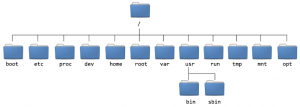It can be a bit tricky to detect and understand the Linux file system for years using the Microsoft operating system.
Basically, the Linux/Unix operating systems include hardware resources, but the “everything” is considered a file.
For example, “/proc/partitions” specifies the partitions on the disk, whereas “/dev/eth0” specifies the connected network adapter.
The following diagram shows the file system hierarchy of a Linux operating system based on Redhat/Centos.
Now let’s try to explain the structure one by one.

- Switch to desktop view to see the tables if you’re using mobile device.
| Folder | Definition |
| / | The root directory at the top of the hierarchy, the rest of it, branches from here. |
| /boot | Contains the files required for the Boot process. e.g. /boot/grub/grub.conf |
| /etc | Contains the configuration files that contain the system settings. e.g. /etc/resolv.conf |
| /proc | It is a virtual folder and on the fly that hosts the process and kernel details. |
| /dev | The folder where the required device files are located. e.g. Physical devices, 0 and random data generators) |
| /home | Hosts the user’s directories. e.g. /home/user 1,/home/user 2 |
| /root | is the user directory for Root. |
| /var | The variable is the directory where the system files reside. e.g. /var/log/messages |
| /usr | A directory where files that are shared among system-wide users are kept. |
| /usr/bin | Non-essential command binaries, for all users. (not required in singular user mode) |
| /usr/sbin | Non-essential binary files. e.g. Programs for various network services |
| /mnt | The Linux file system is a port for temporary environments. e.g. CD-ROM, USB-memory |
| /opt | The directory where external applications are installed. |
| /run | The run-time variable is the directory where the data is kept. e.g. Connected users, running services |
| /tmp | The directory where temporary files are kept. |
When we switch to “Shell”, which is the user interface of the Linux operating system, I will elaborate on the issues.

Yorum yapılmamış
You can leave the first : )